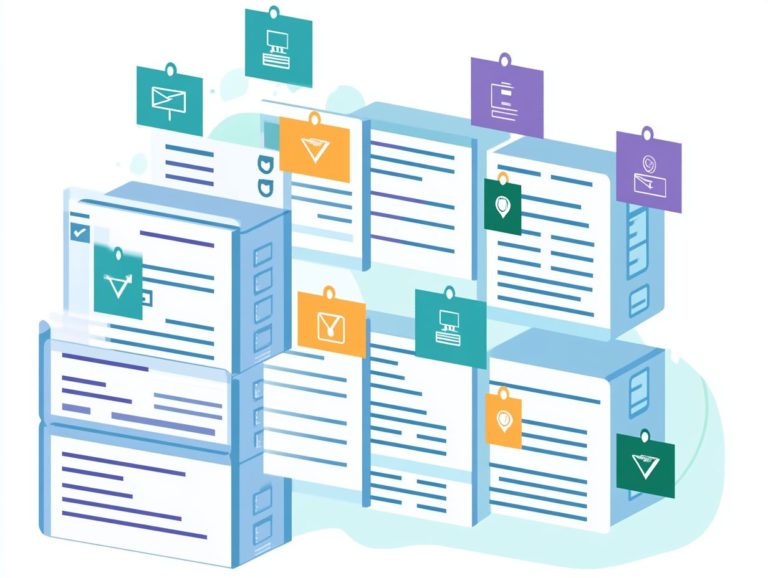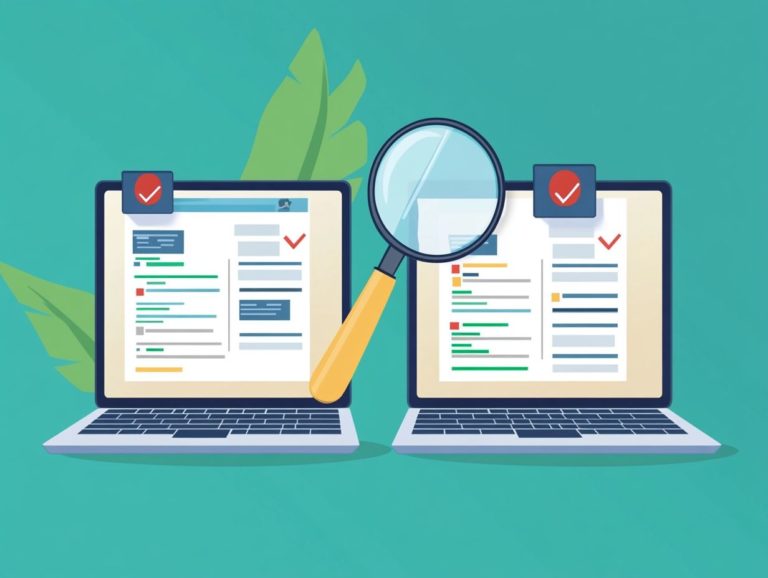Top 10 CRMs for B2B Marketing Strategies
In today s competitive landscape, selecting the right Customer Relationship Management (CRM) system is essential for your B2B marketing triumph. Whether you re launching a startup or steering an established enterprise, a robust CRM can streamline your processes, enhance your customer interactions, and drive your growth.
This article will delve into the top 10 CRMs designed specifically for B2B strategies. We will highlight their key features, pricing options, and the distinct benefits they offer. You ll also learn how to navigate common challenges and unlock your CRM s full potential, positioning your business for future success.
Dive in and discover the CRM that can transform your business today!
Contents
- Key Takeaways:
- 1. Salesforce
- 2. HubSpot
- 3. Pipedrive
- 4. Zoho CRM
- 5. Insightly
- 6. Freshsales
- 7. Agile CRM
- 8. Copper
- 9. Keap
- 10. Apptivo
- What Is a CRM and Why Is It Important for B2B Marketing?
- What Are the Common Challenges of Using a CRM for B2B Marketing?
- How Can a Business Maximize the Use of Their CRM for B2B Marketing?
- What Are the Future Trends for CRMs in B2B Marketing?
- How Can a Business Evaluate the Success of Their B2B Marketing Strategy with a CRM?
- Frequently Asked Questions
Key Takeaways:

Salesforce and HubSpot are top CRMs for B2B marketing, and you can explore the top 5 CRMs for managing client relationships, which offer comprehensive features and integrations for lead generation and customer relationship management.
Choose a CRM that includes lead scoring (a method to rank prospects for sales-readiness), marketing automation, and data analytics to effectively manage and nurture leads.
Implementing a CRM can enhance B2B marketing strategies by improving lead conversion, customer retention, and overall sales performance through data-driven insights and targeted campaigns.
1. Salesforce
Salesforce is a leading B2B CRM platform. It enhances customer relationships and streamlines sales processes.
This platform transforms how you manage client interactions and enables data-driven decisions.
With advanced lead management, Salesforce helps identify and nurture potential clients. You won’t miss any opportunities.
Real-time analytics provide insights for informed decision-making, allowing your sales team to optimize their outreach strategies.
Salesforce elevates customer experience through personalized interactions and timely follow-ups. Its forecasting and reporting tools help anticipate market trends.
Compared to other CRMs, Salesforce excels in integration flexibility and user adoption. It s the top choice for organizations seeking growth.
2. HubSpot
HubSpot stands out as an innovative B2B CRM that seamlessly integrates marketing automation with customer support. This allows you to nurture relationships and optimize interactions with ease.
Its user-friendly interface is crafted for intuitive navigation, enabling you to access a comprehensive array of lead management tools effortlessly.
These features simplify the process of capturing and managing leads. They also enable your team to personalize outreach effectively.
With insightful reporting capabilities, the platform allows you to track performance metrics and adapt your strategies in response to ever-evolving market trends.
This adaptability ultimately enhances the customer experience, ensuring that your interactions feel timely and relevant essential for cultivating lasting relationships.
3. Pipedrive
Pipedrive is your go-to B2B CRM, carefully built to meet your needs. It streamlines your sales pipeline and enables you to craft effective sales strategies.
Pipedrive truly shines in lead management, presenting a visual sales pipeline that allows you to organize leads with remarkable ease.
Its integration with popular tools like Google Workspace and Mailchimp enhances your productivity, facilitating seamless communication and optimized workflows.
You can effortlessly harness actionable insights from its robust analytics and reporting features. This enables you to make informed decisions that resonate with your business objectives.
With Pipedrive s sophisticated sales forecasting capabilities, you can effectively anticipate future sales trends, ensuring you remain ahead in an increasingly competitive landscape.
4. Zoho CRM
Zoho CRM is a versatile B2B solution. It harnesses customer data to enhance your sales automation.
With its comprehensive integration capabilities, you can seamlessly connect with various tools and platforms. This optimizes workflows across different departments.
This robust platform equips you with powerful reporting tools. You can analyze performance metrics, spot trends, and make informed strategic choices quickly.
Not only does it simplify customer interactions, but it also enriches the overall customer journey through personalized communication and tailored experiences.
Users love the intuitive interface that boosts their productivity. Ultimately, this drives revenue growth and enhances operational effectiveness in your organization!
5. Insightly
Insightly is a powerful B2B CRM that integrates seamlessly into your business processes. It delivers actionable insights that elevate your customer relationships and optimize your sales strategies.
This platform shines with its innovative customer lifecycle management feature. It enables you to track interactions and engagement over time, fostering stronger connections.
Its project management capabilities streamline your workflows. This allows your teams to collaborate efficiently on tasks and projects within a centralized environment.
By offering insightful sales forecasting tools, Insightly helps you anticipate revenue trends. You can adapt your strategies to meet changing market conditions, ensuring you remain one step ahead of the competition.
Insightly doesn t merely manage relationships; it enables you to make informed decisions based on real-time data. This drives sustainable growth and paves the way for long-term success.
6. Freshsales
Freshsales is a comprehensive B2B CRM crafted to elevate your customer experience. It offers intelligent sales forecasting and robust reporting tools that streamline your sales process.
Its innovative lead scoring feature ranks potential customers based on their interest level. This ensures that your sales team focuses its efforts on the most promising opportunities.
With seamless email integration, you can effectively track communication. This helps maintain a consistent dialogue with potential clients.
The platform s AI-driven insights provide valuable analytics that can transform your sales strategies. This fosters stronger relationships and enhances overall engagement.
You can tailor your approaches and drive conversions more effectively!
7. Agile CRM

Agile CRM serves as a flexible B2B CRM that integrates essential marketing automation tools with customer support capabilities. This enables you to manage client relationships with remarkable efficiency.
With its robust contact management system, you can easily organize and track all interactions. This ensures that no lead slips through the cracks.
The email campaign feature allows for targeted and personalized communication. This perfectly aligns with modern marketing strategies that prioritize engagement and retention.
Task automation takes the burden off repetitive actions. This gives your team more time to focus on building meaningful relationships.
These combined functionalities enhance overall customer interactions, leading to increased satisfaction and loyalty key ingredients for sustainable business growth!
8. Copper
Copper stands out as a unique B2B CRM solution. It seamlessly integrates with Google Workspace, transforming the way you manage sales processes and performance metrics efficiently.
This integration streamlines your workflows. It ensures that communication and collaboration flow naturally through the tools you already use.
By enhancing productivity, Copper enables your teams to concentrate on the key activities that drive revenue. This frees them from the weight of administrative burdens.
It plays a crucial role in nurturing customer relationships, offering insights that enable you to customize interactions for maximum impact.
With its robust reporting capabilities, you can easily track performance metrics. The intuitive dashboard makes visualizing data effortless, turning strategic decision-making into a simple task!
9. Keap
Keap is your go-to B2B CRM, expertly designed for lead management and marketing automation. It enables you to cultivate meaningful customer interactions and streamline your sales processes with ease.
By harnessing powerful automation tools, you can nurture leads efficiently through personalized communication. This ensures that potential clients receive the right message at just the right moment. Such a tailored approach not only boosts engagement but also builds stronger relationships, positioning your business to respond effectively to each customer’s unique needs.
With its comprehensive CRM functionalities, Keap seamlessly aligns with your diverse business requirements. It helps you organize and track customer interactions, elevating the overall customer experience.
Imagine a more effective sales strategy that drives conversions and builds loyalty!
10. Apptivo
Apptivo stands out as a versatile B2B CRM, offering you a comprehensive suite of tools designed for sales strategy and customer support. This platform equips you to carefully track performance metrics while enhancing your client relationships with ease.
What truly differentiates Apptivo is its impressive project management capabilities, enabling your teams to collaborate seamlessly on tasks and deadlines. You ll appreciate the streamlined invoicing processes that simplify billing, all while ensuring no detail is overlooked.
The customizable solutions let you tailor the platform to meet your specific operational needs, optimizing every facet of your workflow for maximum success. With robust reporting tools at your disposal, you can gain invaluable insights into performance trends, refining your future strategies and maximizing revenue potential.
This holistic approach not only improves your day-to-day operations but also nurtures a more responsive and meaningful relationship with your clients.
What Is a CRM and Why Is It Important for B2B Marketing?
A CRM, or Customer Relationship Management system, is a critical tool for B2B marketing. It s crafted to manage customer relationships and sales processes with impressive efficiency, all while supporting data-driven decisions that can profoundly influence your business growth.
This technology consolidates customer information, streamlining lead management by carefully tracking interactions and spotlighting potential opportunities. With robust CRM capabilities, you can elevate the customer experience by personalizing communication and anticipating client needs.
It also aids in sales forecasting and generates analytical reports, providing you with the insights necessary to devise informed strategies. By automating routine tasks and delivering invaluable analytics, a well-implemented CRM system enables you to optimize your sales processes and fortify your market position.
What Are the Key Features to Look for in a B2B CRM?
When selecting a B2B CRM, you should prioritize key features like sales automation capabilities, robust reporting tools, and effective management of customer interactions to ensure it aligns perfectly with your unique business needs.
Beyond these essentials, lead management functionalities are crucial for capturing and nurturing prospects, ultimately driving those all-important conversions.
Performance metrics provide valuable insights into the effectiveness of your sales strategies and customer engagement, enabling you to make informed adjustments for improved outcomes.
Seamless integration with your existing systems enhances operational efficiency, allowing your teams to collaborate more cohesively without duplicating efforts.
By focusing on these essential features, a B2B CRM not only strengthens your sales processes but also cultivates deeper, more meaningful relationships with customers, ensuring long-term loyalty and success.
Explore how a CRM can transform your business today!
How Can a B2B Business Benefit from Using a CRM?
A B2B business like yours can reap big advantages from adopting a CRM (Customer Relationship Management), streamlining sales processes and enhancing customer relationships.
You’ll see a real boost in efficiency in lead management, allowing your team to prioritize high-value prospects effectively. The enhanced customer experience is another significant perk; CRM solutions facilitate personalized communication and timely follow-ups, fostering loyalty among your clientele.
For example, a well-known technology firm implemented a CRM and saw a remarkable 30% boost in sales forecasting accuracy. This improvement enabled them to allocate resources wisely and tailor their marketing strategies to meet customer needs.
These systems help you make informed choices based on comprehensive data analysis, transforming the way you engage with clients and seize market opportunities.
What Are the Different Types of CRMs Available for B2B Marketing?

You ll find a variety of CRMs tailored for B2B marketing, each designed to address different aspects of customer lifecycle management.
Operational CRMs shine by automating customer-facing processes like sales and service, boosting efficiency and providing invaluable insights into customer interactions.
Conversely, analytical CRMs dive into data analysis, offering tools to help you understand customer behavior, forecast trends, and make well-informed decisions.
Collaborative CRMs prioritize seamless communication, ensuring teams across various departments can easily share information and work together on client projects. This results in a more cohesive and satisfying customer experience.
Each of these CRMs caters to distinct business needs, adapting to the unique ways your company interacts with its clientele.
What Are the Pricing Options for B2B CRMs?
Pricing options for B2B CRMs can be quite diverse, with various models tailored to meet your unique business needs.
You ll often find subscription-based models, which offer predictable monthly fees, making budgeting easy. Tiered plans enable you to choose features that align with your specific requirements and scale them as your business grows.
Several factors influence the overall cost, including your company size and the complexity of your sales processes. Conduct thorough research to find the pricing structure that best fits your operational demands and financial constraints. Explore pricing options now!
How Can a Business Choose the Right CRM for Their B2B Marketing Strategy?
Choosing the right CRM for your B2B marketing strategy requires careful consideration of your specific sales approach and top CRM strategies for small businesses.
Start by evaluating your unique needs and pinpointing the challenges you aim to overcome. Map out your current workflows to ensure the chosen CRM integrates seamlessly into your existing processes.
Next, explore a range of software features. Consider aspects like lead management, automation options, and reporting tools that align with your operational objectives. User reviews can offer valuable insights into real-world experiences, revealing both potential pitfalls and hidden strengths.
Aligning your selected CRM with broader business goals enhances efficiency and fosters sustainable growth.
What Are the Common Challenges of Using a CRM for B2B Marketing?
Using a CRM for B2B marketing presents its fair share of challenges. These include resistance to change and the complexities of integrating with existing systems.
Additionally, effectively managing customer interactions throughout the sales process is crucial.
Navigating data migration, or moving data from one system to another, can be particularly tricky. If not executed with precision, it can lead to inconsistencies and lost information.
Training your staff to adapt to the new system is another significant hurdle. Many employees might feel daunted by unfamiliar technologies.
Measuring the success of your implementation also requires robust analytics, which can be a challenge to establish at the outset.
Invest in training programs to overcome these obstacles. Establish clear communication channels to address any concerns and opt for phased rollouts.
Set clear success metrics early. This keeps everyone aligned and drives a smoother transition.
How Can a Business Maximize the Use of Their CRM for B2B Marketing?
To truly maximize your CRM for B2B marketing, focus on optimizing your lead management processes and enhancing the customer experience.
Align your sales strategy with what your CRM can do. This means embracing best practices, such as utilizing advanced reporting tools to gain valuable insights into sales performance.
This approach allows your teams to identify strengths and weaknesses in their strategies.
Automating repetitive tasks won t just save you time; it also boosts accuracy and efficiency. This frees your employees to concentrate on more strategic initiatives.
Encouraging effective communication among your teams with shared dashboards and notes can create a more cohesive strategy. This deepens their understanding of customer interactions.
Don t overlook the importance of regular training sessions and feedback loops. They re essential for continuous improvement and ensuring that every team member leverages CRM features to their fullest potential.
What Are the Future Trends for CRMs in B2B Marketing?
The future of CRMs in B2B marketing will be significantly influenced by trends like the integration of AI, enhanced market analysis capabilities, and an intensified focus on nurturing customer relationships throughout the sales lifecycle.
These advancements streamline your sales process and provide deeper insights into customer behavior. This enables you to anticipate needs and tailor your interactions effectively.
By harnessing machine learning algorithms, which help computers learn from data, you can generate robust predictive analytics that offer actionable recommendations. This allows your sales team to prioritize leads and optimize follow-ups with precision.
Consequently, sales strategies are evolving to become increasingly data-driven. It’s crucial for your organization to adapt swiftly to these innovations.
Ultimately, this evolution enables you to deliver personalized experiences that strengthen customer loyalty and drive long-term growth.
How Can a Business Evaluate the Success of Their B2B Marketing Strategy with a CRM?
Evaluating the success of your B2B marketing strategy with a CRM requires a keen analysis of performance metrics and a deep understanding of sales processes.
By closely monitoring key performance indicators (KPIs) such as lead conversion rates, customer satisfaction scores, and overall sales growth, you can gain a comprehensive view of your operational effectiveness.
Lead conversion rates shed light on the effectiveness of your marketing campaigns, pinpointing areas for improvement within the sales funnel.
On the other hand, customer satisfaction scores provide invaluable feedback, offering insights into client experiences and highlighting opportunities for service enhancement.
Overall sales growth reflects the health of your business and its position in the market, guiding strategic adjustments to align with ever-evolving customer needs and competitive landscapes.
Interpreting these metrics regularly is crucial for staying ahead of the competition! It allows you to make timely decisions and ensures your strategy remains agile and responsive in a dynamic environment.
Frequently Asked Questions

Top 10 CRMs for B2B Marketing Strategies
Discover the top 10 CRMs for sales forecasting: Salesforce, HubSpot, Marketo, Pardot, Eloqua, Act-On, SharpSpring, Infusionsoft, Zoho CRM, and SugarCRM.
What Makes These CRMs Stand Out?
These CRMs excel in B2B marketing, offering features like lead scoring and account-based marketing.
Can These CRMs Connect with Other Tools?
Yes! Most CRMs integrate easily with email marketing, social media, and analytics platforms.
Best CRM for Small Businesses
SharpSpring, Infusionsoft, and Zoho CRM are perfect for small businesses. They offer affordable plans and can grow with you.
Free Options Available
HubSpot and Zoho CRM both have free versions. While these have limited features, they re excellent for budget-conscious businesses.
How Can These CRMs Benefit B2B Marketing?
These CRMs help you manage leads and automate marketing tasks. They also provide valuable analytics to boost sales and revenue.






